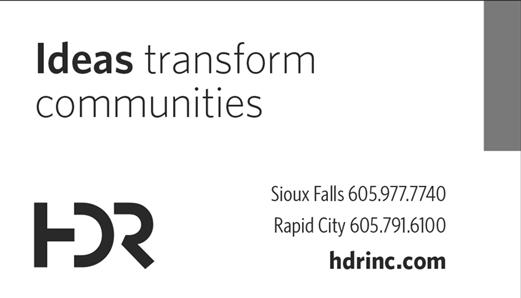
3 minute read
Washington Report: Senator Rounds
Washington Report: Staying Safe Online
By Senator Mike Rounds
Advertisement
The Internet has become such an integral part of our daily lives that most of us take it for granted. It is where we go to read the news, pay our bills, socialize with others, do our shopping and conduct important business. Over the last 15 years, the number of internet users has risen across the world from about 360 million to more than 3 billion.
While the World Wide Web has helped us stay connected with loved ones and become more efficient in our daily lives, we must be mindful of hackers and cyber threats that wish to do us harm.
With all of the information we put on the internet – credit card information, bank account numbers, passwords and social security numbers – it is more important than ever to protect ourselves from attacks. Failing to do so can result in stolen identities, drained checking accounts, fraudulent credit card charges, unwanted solicitation and worse. As we have seen from the recent Office of Personnel Management data breach, which compromised 22 million federal employees’ private information, not even the federal government is safe from a cyber-attack.
While nothing is foolproof, there are things you can do to safeguard your online identity. First, make sure to always set strong passwords and change them frequently on all of your online accounts. Make certain you have antivirus software installed on your computer and install security updates every time your computer prompts you to do so. You should also be cautious when opening e-mails and email attachments from unknown sources. If the address and subject line look suspicious, it could very well be a legitimate threat.
In Washington, D.C., cyber security policy has become a major topic of conversation in recent months because of the wide-ranging effects an attack could have on our nation. Some of our country’s top cyber security leaders, including Admiral Michael S. Rogers, Commander of the U.S. Cyber Command and Director of National Intelligence James R. Clapper, recently spoke to the Senate Armed Services Committee to discuss our military strategy in cyberspace and ongoing cyber threats to U.S. national and economic security. They reinforced the importance of being prepared for any kind of attack on our cyber networks. Last month, the Senate passed the Cybersecurity Information Sharing Act (CISA), which will help protect Americans from such cyber-attacks by allowing companies to share information about cyberthreats to prevent other businesses from falling victim to similar threats. It does so while protecting Americans’ private information from being shared and is 100 percent voluntary. With all the information we put on the Internet today, it’s important that we take steps to protect ourselves online. CISA contains the tools to help mitigate these threats.
In South Dakota, we are doing our part to keep Americans safe from online threats by training students in cyber security. Dakota State University in Madison, which offers a doctoral degree in cyber security, is one of the National Security Agency’s National Centers of Academic Excellence in Information Assurance Education. The demand for highly-trained cyber security experts continues to grow, and Dakota State University is making sure South Dakota students are equipped and trained to fill those jobs. I’m proud that Dakota State University has become a nationally recognized leader in this important field and I look forward to watching their progress.
All individuals, businesses and organizations should take time to review their online security settings and make necessary changes to protect themselves from cyber threats.


Engineering for a better South Dakota since 1956
VISIT US! www.acecsd.org

























